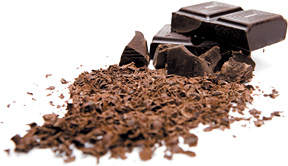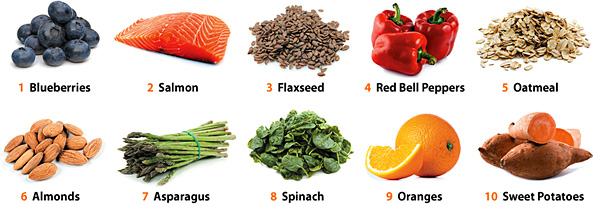The researchers found evidence suggesting an inverse association between frequency of chocolate consumption and coronary heart disease; specifically, consumption of chocolate more than five times a week was associated with 57 percent lower prevalence of coronary heart disease, as compared to those subjects who did not consume chocolate.
[Keep in mind that not any chocolate will do; you can't go around eating candy all day and expect to help your heart (or overall health, for that matter); for more information, read "Chocolate: The Next Miracle Food?" in the August 2010 issue of
TYH.]
 Source: Djousse L, et al. "Chocolate Consumption Is Inversely Associated With Prevalent Coronary Heart Disease: The National Heart, Lung, and Blood Institute Family Heart Study." Clinical Nutrition, Sept. 19, 2010.
Source: Djousse L, et al. "Chocolate Consumption Is Inversely Associated With Prevalent Coronary Heart Disease: The National Heart, Lung, and Blood Institute Family Heart Study." Clinical Nutrition, Sept. 19, 2010.
Healthy Fats, Healthy Heart?
Low HDL (high-density lipoprotein, "good" cholesterol) levels and high LDL (low-density lipoprotein, "bad" cholesterol) levels are a risk factor for cardiovascular disease. Previous studies have suggested that the addition of dietary monounsaturated fatty acids (MUFA), common in the Mediterranean diet, is a viable approach to raising HDL levels. David Jenkins, from St. Michael's Hospital (Ontario, Canada), and colleagues recruited 17 men and 7 postmenopausal women to complete a very low saturated fat diet before being randomly assigned to either a high-MUFA diet or a low- MUFA diet. Both groups of patients were assigned to a specific vegetarian diet that included oats, barley, psyllium, eggplant, okra, soy, almonds and a plant sterol-enriched margarine.
In the high-MUFA group, the researchers substituted 13 percent of calories from carbohydrates with a high-MUFA sunflower oil, with the option of a partial exchange with avocado oil. The team found significant reductions in blood cholesterol levels over the two-month study period for participants, with the replacement of 13 percent of total calories from carbohydrate by monounsaturated fats in the dietary portfolio resulting in a 12.5 percent increase in HDL and 35 percent reduction in LDL.
"Monounsaturated fat increased the effectiveness of a cholesterol-lowering dietary portfolio," wrote the researchers. "The potential benefits for cardiovascular risk were achieved through increases in HDL cholesterol, further reductions in the ratio of total to HDL cholesterol and reductions in C-reactive protein."
Source: Jenkins DJA, et al. "Adding Monounsaturated Fatty Acids to a Dietary Portfolio of Cholesterol-Lowering Foods in Hypercholesterolemia." Canadian Medical Association Journal, November 2010.
So eat your way to a healthy heart; that's what the research suggests. With these and countless other foods associated with cardiovascular fitness, what reason could you possibly have for avoiding a heart-healthy meal plan starting today? Talk to your doctor for more information on how small dietary changes can improve your cardiovascular and overall health.
10 More! Other Important Foods for Heart Health
You can’t really get enough of heart-healthy foods, and fortunately, they’re in abundance; in addition to the foods mentioned in this article, check out these 10 tasty foods that can help optimize your cardiovascular system. Source: WebMD.com

Ronald Klatz, MD, is the president of the American Academy of Anti-Aging (www.worldhealth.net), a nonprofit organization dedicated to the prevention, detection and treatment of aging-related disease.
Robert Goldman, MD, is the chairman of the American Academy of Anti-Aging (www.worldhealth.net), a nonprofit organization dedicated to the prevention, detection and treatment of aging-related disease.

